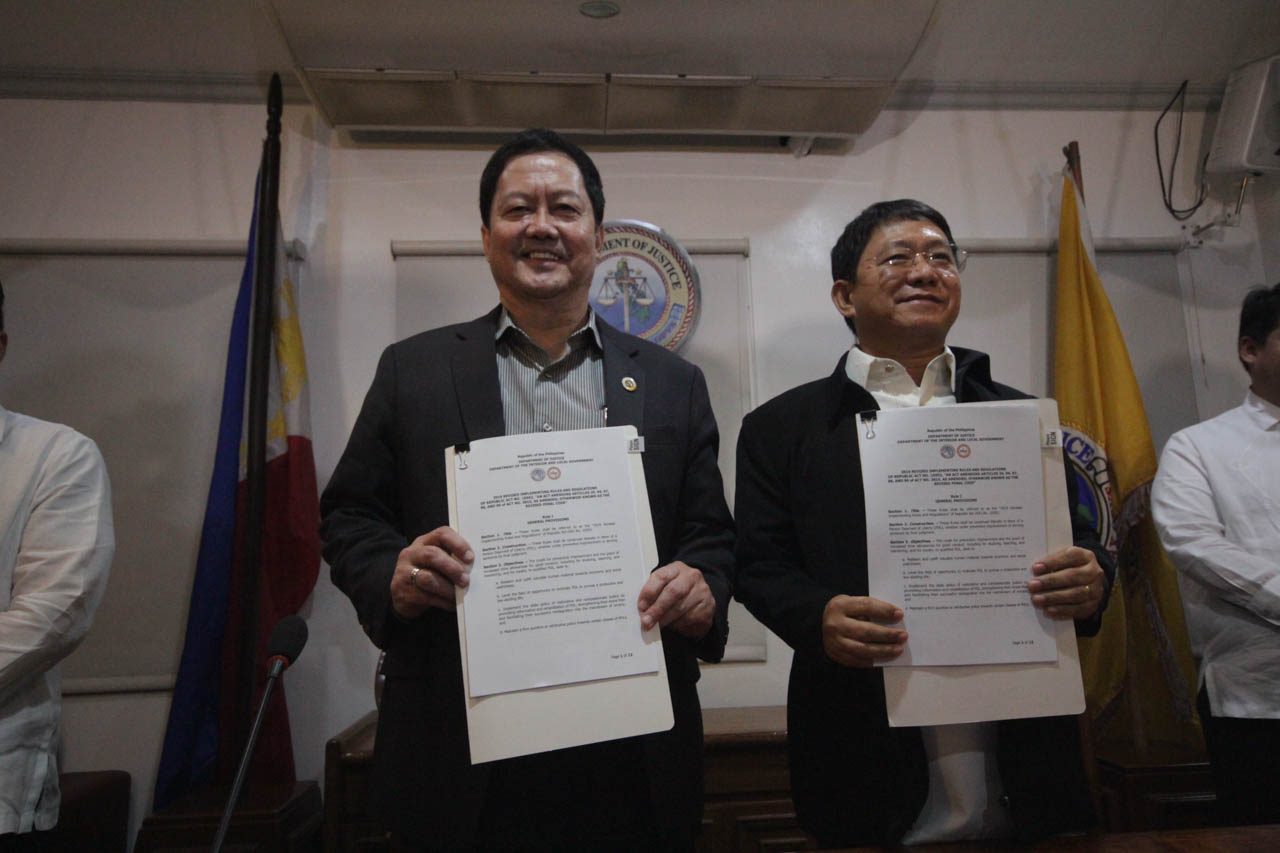SUMMARY
This is AI generated summarization, which may have errors. For context, always refer to the full article.

MANILA, Philippines – Under the new Implementing Rules and Regulations (IRR) of Republic Act 10592, heinous crime convicts detained after 2013 will be unable to avail of any type of good conduct time allowance.
The joint committee of the Department of Justice (DOJ) and Department of the Interior and Local Government (DILG) announced on Tuesday, September 16, that it has revised the IRR of RA 10592 and categorically excluded heinous crime convicts from the GCTA Law.
Under this new IRR, the GCTA Law (RA 10592) which was passed in 2013, does not cover heinous crime convicts. Before 2013, it was Article 97 of the Revised Penal Code (RPC) that covered good conduct time allowance for all types of prisoners.
For the DOJ and the DILG, no law covers heinous crime convicts detained after 2013.
“We made it clear that if the Person Deprived of Liberty (PDL) is disqualified but had been under preventive imprisonment or served sentence prior to the effectivity of RA 10592, lower time allowances under the Revised Penal Code will continue to accrue but a disqualified PDL placed under preventive detention or convicted after effectivity of RA 10592 will not earn any such additional allowance,” Justice Secretary Menardo Guevarra said on Tuesday after he and Interior Secretary Eduardo Año signed the new IRR.
Guevarra said heinous crime convicts detained before 2013, or before RA 10592 became effective, can still avail of the much lesser GCTA under the RPC. But heinous crime convicts detained after the law was passed cannot avail of any good conduct time allowance.
“May pag-asa pa naman na ma-release sila, not under GCTA, but presidential amnesty, pardon, parole, or ‘pag dumating na, na 85 years old na sila, for humanitarian consideration, ‘yun na ‘yung maga-apply,” said Año.
(They still have hopes of being released, not under GCTA, but through presidential amnesty, pardon, parole, or if they reach 85 years old, they can fall under humanitarian consideration, that’s what will apply.)
Possible contentions
The exclusion of post-2013 inmates from any type of GCTA may potentially bring up the issue of equal protection.
Equal protection of the law was the constitutional guarantee invoked by prisoners that got the Supreme Court to retroactively apply RA 10592.
There is also the issue of good faith.
The Bureau of Corrections (BuCor) has always interpreted the law to include heinous crimes so it has released since 2013 a total of 1,914 heinous crimes convicts, who are now being asked to surrender.
There is a huge difference between GCTA under RA 10592 and GCTA under RPC, such that Guevarra said convicts like Antonio Sanchez will definitely not be released now under the RPC.
RA 10592 can slash up to half an inmate’s sentence, crediting 20 days per month on only the first two years of sentence. Article 97 of the RPC only gives a good conduct credit of 5 days each month on the first two years of sentence.
A heinous crime convict released on that interpretation of the law can argue that at the time of his release, this new IRR was not yet in existence.
There is also the issue of the IRR being an ex-post facto law, or a law that will penalize a crime that was committed at a time when it was not yet illegal to do so.
Guevarra said let the court decide.
“If he challenges that in court, of course the court will have to make a decision on that, but as far as the DOJ is concerned, if you were not entitled to begin with, you acted in good faith, it was not your fault, that’s beside the point, you have to go back and serve your full sentence, you want to challenge that before the court, let the court decide on it,” said Guevarra.
Asked whether the BuCor and the DOJ are equipped to handle possible lawsuits from prisoners, Guevarra said: “Let the Office of the Solicitor General (OSG) take care of that.” – Rappler.com
Add a comment
How does this make you feel?
There are no comments yet. Add your comment to start the conversation.